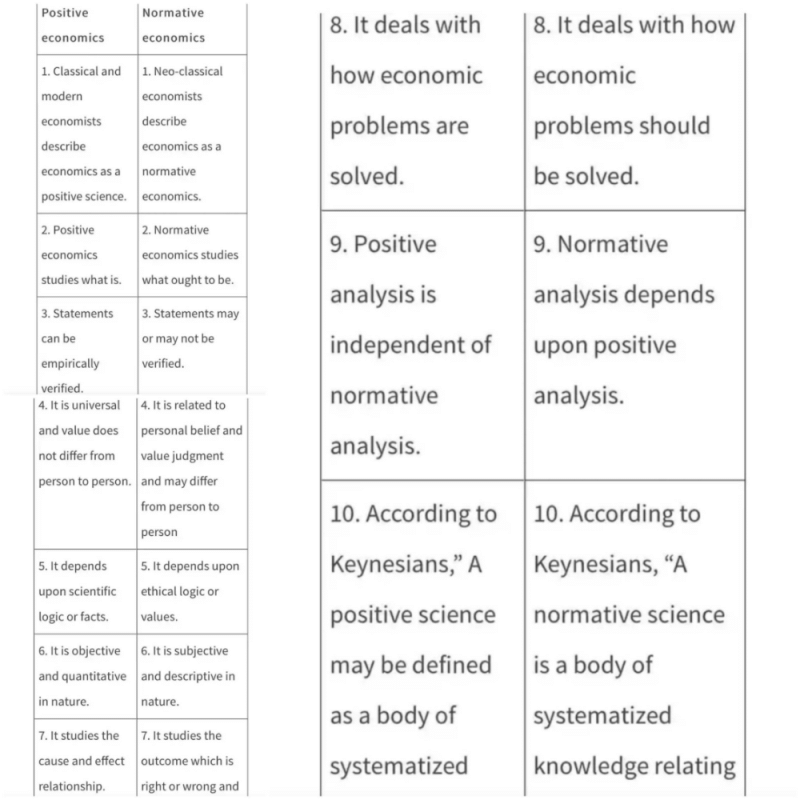Commerce Exam > Commerce Questions > Distinguish between positive and normative ec...
Start Learning for Free
Distinguish between positive and normative economics?
Most Upvoted Answer
Distinguish between positive and normative economics?

Community Answer
Distinguish between positive and normative economics?
Positive Economics
Positive economics is an objective approach to studying economics, focusing on facts and cause-and-effect relationships. It deals with what is or what will be, based on data, theories, and empirical evidence. Here are key points to distinguish positive economics:
- Objective Analysis: Positive economics involves objective analysis of economic phenomena without incorporating personal opinions or value judgments.
- Factual Statements: It focuses on making factual statements about the economy, such as stating that an increase in taxes leads to a decrease in consumer spending.
- Empirical Evidence: Positive economics relies on empirical evidence and data to support its theories and conclusions.
- Descriptive: It describes economic events, trends, and patterns as they are without prescribing how they should be.
Normative Economics
Normative economics, on the other hand, involves subjective judgments and value-based analysis. It deals with what should be or what ought to be in the economy, based on individual beliefs, values, and ideologies. Here are key points to distinguish normative economics:
- Subjective Analysis: Normative economics involves subjective analysis that incorporates personal opinions, values, and judgments.
- Value Judgments: It includes making value judgments about economic policies and outcomes, such as stating that a particular tax policy is fair or unfair.
- Prescriptive: Normative economics prescribes policies and recommendations on how the economy should be managed or what actions should be taken.
- Opinion-based: It is based on opinions, values, and ideologies, which can vary among individuals or groups.
In conclusion, while positive economics focuses on objective analysis and factual statements about the economy, normative economics involves subjective judgments and value-based analysis, prescribing what should be done in the economy based on individual beliefs and values.
Positive economics is an objective approach to studying economics, focusing on facts and cause-and-effect relationships. It deals with what is or what will be, based on data, theories, and empirical evidence. Here are key points to distinguish positive economics:
- Objective Analysis: Positive economics involves objective analysis of economic phenomena without incorporating personal opinions or value judgments.
- Factual Statements: It focuses on making factual statements about the economy, such as stating that an increase in taxes leads to a decrease in consumer spending.
- Empirical Evidence: Positive economics relies on empirical evidence and data to support its theories and conclusions.
- Descriptive: It describes economic events, trends, and patterns as they are without prescribing how they should be.
Normative Economics
Normative economics, on the other hand, involves subjective judgments and value-based analysis. It deals with what should be or what ought to be in the economy, based on individual beliefs, values, and ideologies. Here are key points to distinguish normative economics:
- Subjective Analysis: Normative economics involves subjective analysis that incorporates personal opinions, values, and judgments.
- Value Judgments: It includes making value judgments about economic policies and outcomes, such as stating that a particular tax policy is fair or unfair.
- Prescriptive: Normative economics prescribes policies and recommendations on how the economy should be managed or what actions should be taken.
- Opinion-based: It is based on opinions, values, and ideologies, which can vary among individuals or groups.
In conclusion, while positive economics focuses on objective analysis and factual statements about the economy, normative economics involves subjective judgments and value-based analysis, prescribing what should be done in the economy based on individual beliefs and values.
Attention Commerce Students!
To make sure you are not studying endlessly, EduRev has designed Commerce study material, with Structured Courses, Videos, & Test Series. Plus get personalized analysis, doubt solving and improvement plans to achieve a great score in Commerce.

|
Explore Courses for Commerce exam
|

|
Similar Commerce Doubts
Distinguish between positive and normative economics?
Question Description
Distinguish between positive and normative economics? for Commerce 2024 is part of Commerce preparation. The Question and answers have been prepared according to the Commerce exam syllabus. Information about Distinguish between positive and normative economics? covers all topics & solutions for Commerce 2024 Exam. Find important definitions, questions, meanings, examples, exercises and tests below for Distinguish between positive and normative economics?.
Distinguish between positive and normative economics? for Commerce 2024 is part of Commerce preparation. The Question and answers have been prepared according to the Commerce exam syllabus. Information about Distinguish between positive and normative economics? covers all topics & solutions for Commerce 2024 Exam. Find important definitions, questions, meanings, examples, exercises and tests below for Distinguish between positive and normative economics?.
Solutions for Distinguish between positive and normative economics? in English & in Hindi are available as part of our courses for Commerce.
Download more important topics, notes, lectures and mock test series for Commerce Exam by signing up for free.
Here you can find the meaning of Distinguish between positive and normative economics? defined & explained in the simplest way possible. Besides giving the explanation of
Distinguish between positive and normative economics?, a detailed solution for Distinguish between positive and normative economics? has been provided alongside types of Distinguish between positive and normative economics? theory, EduRev gives you an
ample number of questions to practice Distinguish between positive and normative economics? tests, examples and also practice Commerce tests.

|
Explore Courses for Commerce exam
|

|
Suggested Free Tests
Signup for Free!
Signup to see your scores go up within 7 days! Learn & Practice with 1000+ FREE Notes, Videos & Tests.

























